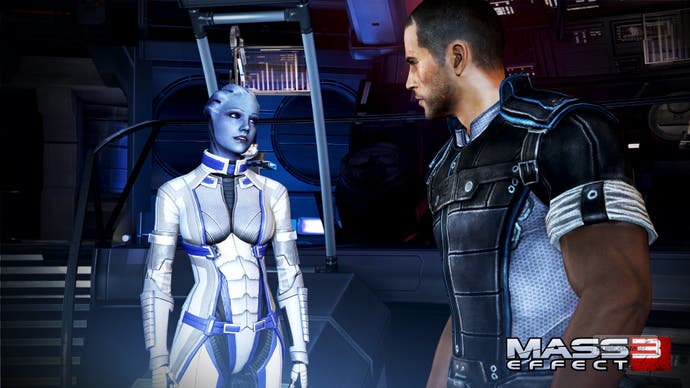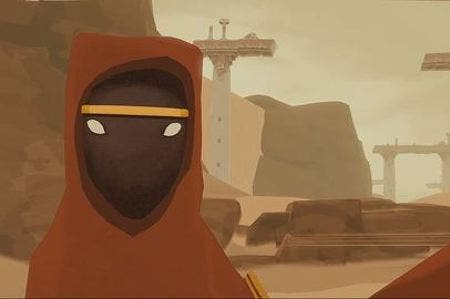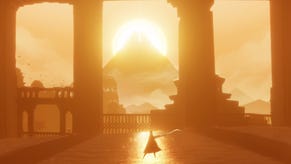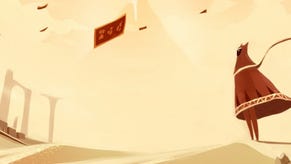Game of the Week: Journey
If only you could talk to the people?

"If only you could talk to the monsters," goes the much-mocked and only slightly misquoted line from Edge magazine's review of the 1994 classic, Doom. How we laughed! And yet, it was quite a statement of intent for a magazine that has always championed meaningful evolution for games and deeper experiences for gamers.
With 18 years (eighteen years) of hindsight, though, it also serves as a kind of warning to be careful what you wish for. Try getting a game in 2012 to shut the hell up for a minute.
I'm not being literal, quite. It's not like we'll all be taking tea and chatting about the weather with the Reapers this weekend (even though some of us might be barking orders at our team-mates via Kinect). And it's hardly as if we now find ourselves longing, wistfully: "If only you could shoot the monsters in the face." The nameless author of that review is probably feeling vindicated, depressed or both by the lack of significant progress in the last two decades, especially in the genre Doom defined.
But the reason we all tittered was the misapplication of this lofty ideal to a game whose greatest virtue was its brutal purity. (The Elder Scrolls: Arena, also released in 1994, might have been a more suitable subject - and look how it's grown!) It's that purity that's in danger of being lost under a snowdrift of option, extension, connection and customisation.

Sign in to Facebook to find friends? Download the iPhone app to take part in the meta-game. You unlocked a new skin! Seduce your companion, marry the quest-giver, navigate the moral maze to any colour of outcome you like (as long as it's black). Experiment with your sexuality in a safe virtual environment. Do you like to do it alone? Or with friends? Or against strangers? There's a mode for that.
It's all our own fault anyway - gamers' insatiable hunger for More Freedom and New Stuff has mated with the limitless possibilities of the internet to create a sort of event horizon of feature creep. You'd think a ten-dollar arcade game with a no-nonsense title like Shoot Many Robots would be immune, but no. Levelling, weapon customisation and co-op are all fun in themselves (micropayments maybe less so), but their net effect is to dilute what could have been a pure, visceral shooter - a Doom in 2D.
"In trying to stretch its punchy charms across dozens of near-identical stages, thousands of customisation options and endless weapon combinations, Demiurge has bitten off more than most players will want to chew and sells the inherent appeal of its game short in the process," wrote Dan in our Shoot Many Robots review. "This is a game structured around a methodical slog even though it's most enjoyable in short intense bursts, leaving the road to completion looking increasingly long and daunting as the difficulty ramps up."
Sometimes we need to be rapped on the knuckles with a ruler and told, sternly, that no, we can't have everything we want all the time - or we'll never learn to appreciate what we have.
Journey
There's been a great deal of critical frothing and swooning over thatgamecompany's latest PS3 download, much of it over the top, most of it deserved. It's a simply gorgeous piece of work. The fact that some are treating it more like a spiritual experience than a video game only goes to show the incredible power of leaving stuff out.
Combat. 'Lore.' Dialogue. Party chat. Even the slightest semblance of control over your interactions with other players online. Talk. All things Jenova Chen and his team opted not to put into Journey. In its mechanical bones, Journey's a fairly conventionally put together action adventure - power up this, unlock that, jump over here to progress. But its empty spaces speak volumes: the open stretches of sand dunes containing no hazards; the long, lonely wait to see another player; the necessarily wordless communion when you do find one.
We've come to take the presence of real people alongside us in virtual worlds for granted, and it takes a game of Journey's admirable restraint to remind us how magical that experience can be. In just the same way, this game summons poetry, spectacle and drama from something that used to amaze but has become routine: no more - and certainly no less - than the chance to explore an imaginary world.
"Play Journey with a random - and chances are that you will - and all the convenient metaphors and artificiality melt away," wrote Chris in our Journey review. "The game's lunges at profundity disappear, and you're left to focus on the core of the experience: a pilgrimage, filled with incident, compacted into the space of a few glorious set-pieces.
"Granted, thatgamecompany's done most of the work for you. The studio has poured the deserts, trashed the temples and filled the world with the floating presence of a nameless almighty. The truly brilliant move, though, was to leave a space at the very centre of the design that only a stranger can fill.
"The master stroke, as in all great myths, lies not with God, but with the human element."
Never mind talking to the monsters - Journey is a reminder that some of the greatest things about video games can't be put into words at all.









